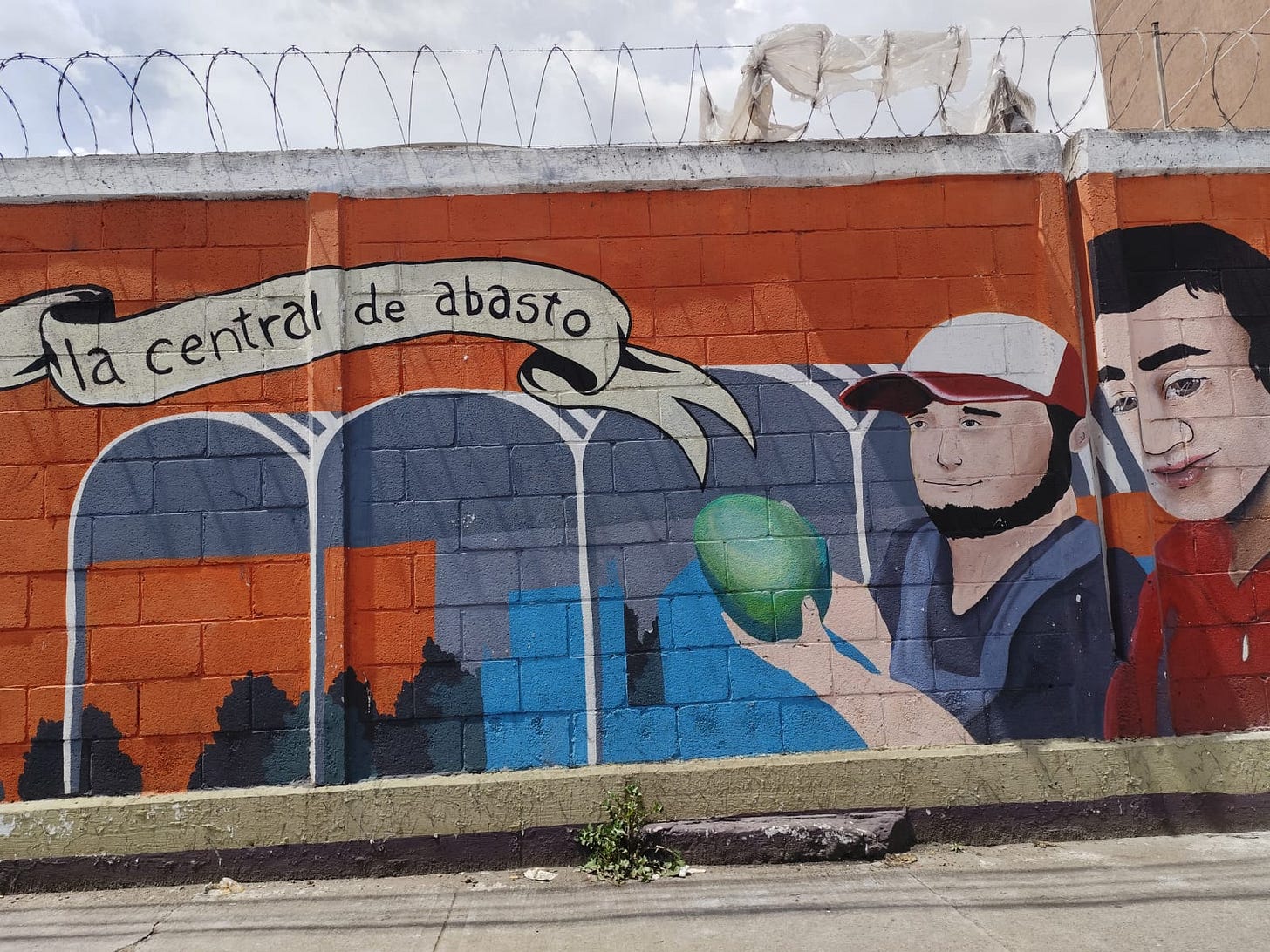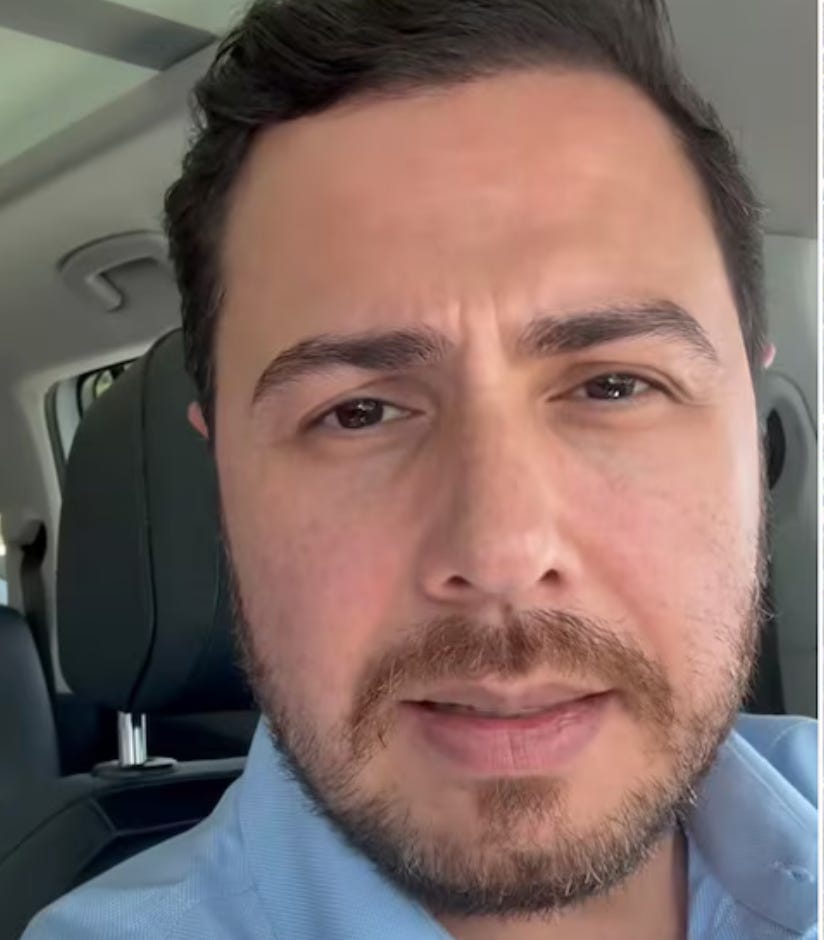Mexico's Soaring "Narco-Inflation"
Even the price of orange juice is impacted by cartels
Para leer en español click aquí.
UPDATE on Oct. 22 - This Monday, the tortured body of lime farmer leader Bernardo Bravo Manríquez was found in his car on the road near Apatzingán, Michoacán. The murder came after Bravo, 41, released a video in which he called for lime farmers to stand up to the extortionists who squeeze money from them.
While such killings are painfully common in Mexico, this has become front page news here. In this story I had written last year, I look at how how extortion is one of the biggest challenges facing President Claudia Sheinbaum and has wider effects on the Mexican economy and society.
Covering 600 acres in the east of Mexico City, the sprawling “Central de Abasto” is one of the biggest wholesale food markets in the world, opening before dawn to serve thousands of tons of fruit, veg, meat and fish trucked in from across the country. Walking through its labyrinth of stalls, you find dozens of types of chili, mountains of limes, gigantic sweet corns, creamy avocados just ready to munch and endless other treats.
Supplying the vast metropolis of the Mexican capital and beyond, the Central is second only to the stock exchange in its value of commerce in Mexico. Yet tragically, the price of this trade is being pushed up by gangsters. As cartels (or to be more precise, hierarchical networks of paramilitary organized crime) shake down agricultural producers, as well as suppliers and transporters, the price hikes are evident in the stalls of the Central. Opposition federal deputy Rubén Moreira has dubbed it “narco inflation.”
Cartel extortion of lime and avocado farmers in the western state of Michoacán has long been documented. This was a major reason for the rise of autodefensas, or self-defense squads, from 2013 to 2014 and it has got so bad that lime farmers are currently halting production over it. (In some spots, prices have doubled to over 60 pesos or $3 a kilo.)
But gangsters have also expanded to shake down an array of producers across the country from chicken factories in Mexico State to tortilla shops in Guerrero to fishermen in Sonora. In the end, consumers take a hit as it impacts prices in markets and then in restaurants. While inflation eases in the United States, Mexico’s consumer price index ticked up in July to above 5 percent and is much higher on certain food goods.
One example is fresh orange juice, which I like to get daily from the stalls dotted every few blocks in Mexico City. The price of a liter has shot up from about 40 pesos to 80 pesos ($2 to $4) over a few months. While it does go up seasonally and a drought in the spring contributed, a wholesaler in the Central told me that extortion is a factor. “Our suppliers are having to pay quota [an extortion fee] and they pass the price onto us, and then you end up paying more on the street,” he said.
Much of the summer supply of oranges comes from southern Tamaulipas where the fruit are picked in remote orchards and taken down the same dirt roads, or brechas, used for drug and human smuggling. The orchards themselves don’t pay but both the truck companies moving the fruit and warehouses storing them give a fee to the cartel, a farmer in the region said.
Most victims don’t report extortion for a very real fear of repercussion; in July, the head of the chamber of commerce in Matamoros was shot dead after publicly condemning shakedowns. As a result, Mexican police statistics on extortion are close to useless and really reflect threatening phone call scams to the general public.
However, economist (and former deputy) Mario Di Costanzo says his investigations show a huge increase of extortion and estimates that cartels are now banking about 200 billion pesos or $10 billion a year from the crime. “They are seizing control of all the economic activities,” Di Costanzo said.
This level of shakedowns poses a real threat to the economic life of tens of millions of Mexicans who had not before been touched by organized crime. It’s a culmination of a shift of cartels from the primary activity of drug trafficking to a range of rackets over the last two decades that has reached fever pitch.
It’s tough to find historical comparisons. The mafia runs protection rackets in southern Italy but they are different as I will get into below. Central American countries such El Salvador have suffered widespread extortion from gangs but this is focused on small businesses in an economy a fraction of the size. Mexican cartels are sucking from a GDP of almost $1.5 trillion.
The expansion of extortion has happened under President Andrés Manuel López Obrador who has failed to come up with any strategy to stop it. We can hope that his successor Claudia Sheinbaum will take it seriously or it could provoke a social explosion, a Michoacán-style uprising across the country.
The Business of Private Protection
Sorry folks, you need to subscribe to read the rest of this story. But it’s only the price of a cuppa coffee and you get the complete archive including exclusive interviews with top players and maps of cartel territory. And now is a great time to subscribe as we will be following these issues with detailed reports you can trust as big things break in the coming months.




